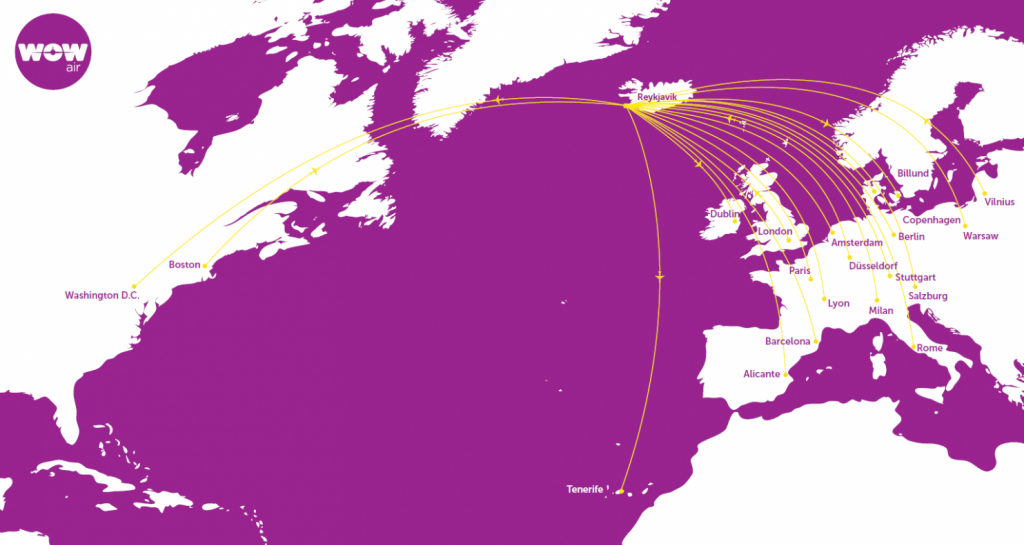Meanwhile, while ALPA has all pilots distracted on the Norwegian issue:
We're in the midst of one of the most expensive times to travel: holiday season. And yet, we're also, more broadly, experiencing a great reckoning within the air travel industry that has seen budget, no-frills airlines, like Spirit Air, rise to prominence -- while traditional air carriers, which have long prioritized comfort, have suffered.
This piece, originally published in October, explains why making transatlantic travel cheap is a harder task than it might sound, and highlights one airline that's trying to beat the odds by offering extremely affordable flights to Europe.
Wow Air, the roughly three-year old discount air carrier, is going where few other ultra low cost airlines have gone: across the Atlantic. And if all goes according to plan, it's going to do it much cheaper than anyone else.
The budget airline, which is based in Iceland, announced last week that it will begin flying passengers non-stop from both Boston and Baltimore to Reykjavik, Iceland for as little as $99 each way. The airline will also offer one-stop flights from the two U.S. cities to London and Copenhagen, starting at $228 for a round trip. The airline will begin offering the flights next March.
"Paying even $200 for a one-way flight to, say, London, is unheard of," said Tom Parsons, the CEO of bestfares.com, which tracks airline pricing. "It just doesn't exist."
The incredibly low ticket prices are real, but don't expect them to last forever. "Those are definitely opening, introductory fares," said Skuli Mogensen, Wow Air's chief executive. "On an occasional basis we hope to be able to introduce similar fares, but those very aggressive. We wouldn't be talking if I had introduced prices more commonly seen in the market, would we?"
But the airline's commitment is to offer the cheapest ticket for every route the airline flies, including transatlantic routes, Mogensen said. The prices Wow Air offers will vary by season, and depend on a number of other factors, including fuel prices and flight vacancies.
famous for squeezing passengers' knees, Wow Air won't skimp quite as much on leg room. The seat pitch, the distance between two seats, is between 30 and 36 inches on the Airbus A320 aircrafts flown by the airline, said Svanhvít Fridriksdóttir, Wow Air's director of communications. Most pitch sizes are about 31 inches, and many discount carrier pitch sizes are less than 30 inches. Spirit Airlines', for instance, is 28 inches.
Wow Air also expects to save money by operating as efficiently as possible. The company relies heavily on online sales and marketing, for instance, which allows it to skip the cost of middlemen. It also operates few airplanes—only four currently—but maximizes their utility. "We have extremely good aircraft utilization," said Mogensen. "Within one 24-hour cycle, a single airplane will fly from Iceland to Boston, back to Iceland, and continue to London, and then back to Iceland, each time full of passengers."
as cheap as advertised, and the routes have been stricken with delays, according to Mann. "Norwegian has had huge difficulties," he said. "All across the summer it has been running relays for its transatlantic flights to and from New York."
The biggest obstacle to discount long distance air travel might simply be that long trips could strip an airline like Wow Air of the efficiency on which it so heavily relies. Despite Wow Air's advantage of being able to stop in Iceland, the nearly 5.5-hour flight between Boston and Reykjavik is still long by budget airline standards.
A comparatively small fleet becomes a competitive disadvantage as soon as there's a delay. "Once it starts to get off-schedule, they'll never get it back on schedule unless they start cancelling flights," said Mann. Likely for that very reason, low cost carriers have soared domestically, but shied away from routes between North America and Europe. Discount airlines currently control nearly a third of the airline market in North America, and more than third of it in Europe, but only about 1 percent of the market for transatlantic travel.

